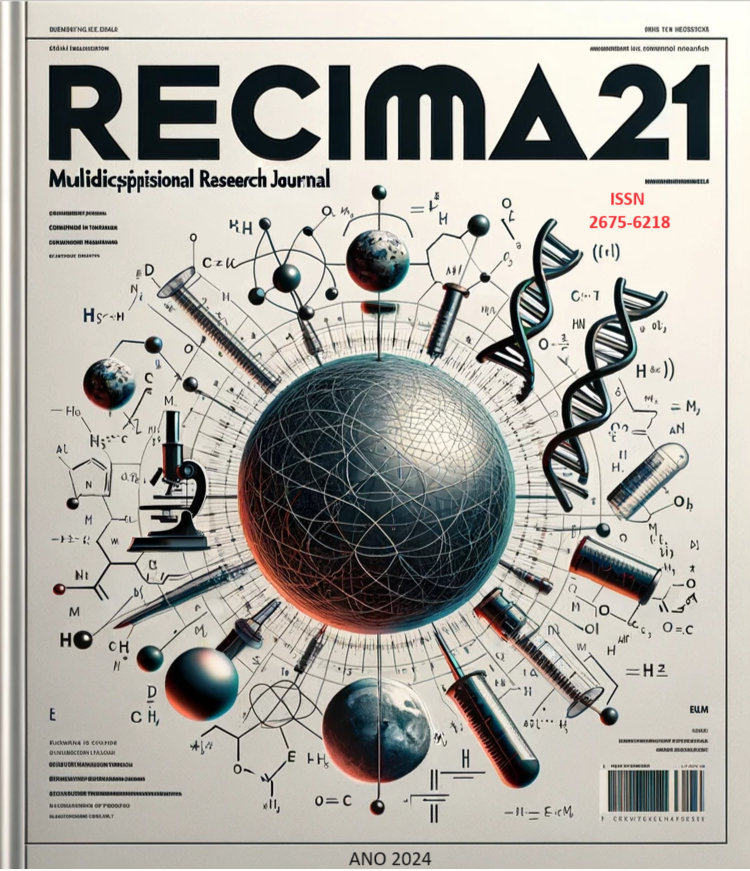PROBLEM-BASED LEARNING AND THE USE OF MODELS: A PROPOSAL
DOI:
https://doi.org/10.47820/recima21.v5i10.5831Keywords:
hypothetical model, problem-based learning, modelsAbstract
The training of teachers is crucial for the development of a nation. The traditional teaching method has proven insufficient to meet the demands of the labor market, while active methodologies promote autonomy and critical thinking. For this work, the aim was to present a method obtained through a literature review and inferences drawn from the analyzed sources. This method addresses the question of whether or not there is a scientific method and, consequently, a common teaching method for individuals. Initially, principles or parameters governing the interactions between the subject, the systems, and the stimuli were drawn from diverse literature. Subsequently, a reflection was made on problems as generators of intentions and research, as well as the adoption of models as a way to make the objects of study more accessible. Finally, a hypothetical model was presented. Although the formulation of a hypothetical model is important, there is a need to confront it with reality, therefore, future research is suggested.
Downloads
References
BORGES, M. C. et al. Aprendizagem baseada em problemas. Revista Medicina (Ribeirão Preto) v. 47, n. 3, p. 301-7, 2014. Disponível em: https://edisciplinas.usp.br/pluginfile.php/2898546/mod_folder/content/0/Aprendizado%20baseado%20em%20problemas.pdf. Acesso em: 04 jul. 2023. DOI: https://doi.org/10.11606/issn.2176-7262.v47i3p301-307
CUETO, J. C. Um ano depois, como estão as crianças resgatadas após 40 dias perdidas na Floresta Amazônica. BBC News Brasil, 11 jun. 2024. Disponível em: https://www.bbc.com/portuguese/articles/cp44ngv1q2jo. Acesso em: 03 out. 2024
DICIO - DICIONÁRIO ONLINE DE PORTUGUÊS. Parábola. Porto: 7Graus, 2024. Disponível em: https://www.dicio.com.br/parábola/. Acesso em: 02 out. 2024.
DICIO - DICIONÁRIO ONLINE DE PORTUGUÊS. Sistema. Porto: 7Graus, 2024. Disponível em: https://www.dicio.com.br/sistema/. Acesso em: 02 out. 2024.
FREZATTI, F. et al. Aprendizagem baseada em problemas (PBL): uma solução para aprendizagem na área de negócios. São Paulo: Atlas, 2018.
KILROY, D. A. Problem based learning. Emerg Med., v. 21, p. 411-413, 2004. doi 10.1136/emj. 2003.012435 DOI: https://doi.org/10.1136/emj.2003.012435
KLEIN, N. A.; AHLERT, E. M. Aprendizagem baseada em problemas como metodologia ativa na educação profissional. Revista Destaques Acadêmicos, Lajeado, v. 11, n. 4, 2019. DOI: https://doi.org/10.22410/issn.2176-3070.v11i4a2019.2398
LEMOS, J. R.; EDSON-CHAVES, B. Morfologia e Anatomia Vegetal: uma abordagem prática. Teresina: EDUFPI, 2022. E-book. ISBN 978-65-5904-158-9.
LÖSCH, S.; RAMBO, C. A.; FERREIRA, J. L. A pesquisa exploratória na abordagem qualitativa em educação. Revista Ibero-Americana de Estudos em Educação, Araraquara, v. 18, p. e023141, 2023. DOI: 10.21723/riaee.v18i00.17958. Disponível em: https://periodicos.fclar.unesp.br/iberoamericana/article/view/17958. Acesso em: 2 out. 2024. DOI: https://doi.org/10.21723/riaee.v18i00.17958
MOURÃO, I. A. C. L. História genealógica do conceito de homologia: Uma análise filomemética. 2016. Dissertação (Mestrado em Sistemática) - Universidade de São Paulo, São Paulo, 2016.
NASA. The ‘Face of Mars’. [S. l.]: Nasa, 1976. Disponível em: https://www.nasa.gov/multimedia/imagegallery/image_feature_567.html. Acesso em: 3 out. 2024.
OLIVEIRA, T. F.; FRIGOTTO, G. As bases da EPT em sua relação com a sociedade brasileira: concepções e práticas em disputa. In: SILVA, C. N. N.; ROSA, D. S. (org.). As Bases Conceituais na EPT. Brasília, DF: Grupo Nova Paideia, 2021. Capítulo 1. p. 14-16. DOI: https://doi.org/10.36732/EditoraNovaPaideia.2021.221
RIBEIRO, L. R. C. Aprendizagem baseada em problemas (PBL): uma experiência no ensino superior [online]. São Carlos: EdUFSCar, 2008.
SANTAELLA, Lucia. O que é semiótica. São Paulo: Brasiliense, 1983.
SQUIRE, L. R. et al. Fundamental Neuroscience. 3. ed. San Diego: Elsevier, 2008.
VYGOTSKY, L. S. Pensamento e linguagem. São Paulo: Martins Fontes, 1999.
WARDLE, S. G.; SEYMOUR, K.; TAUBERT, J. Characterizing the response to face pareidolia in human category-selective visual córtex. BioRxiv, 2017. https://doi.org/10.1101/233387 DOI: https://doi.org/10.1101/233387
Downloads
Published
License
Copyright (c) 2024 RECIMA21 - Revista Científica Multidisciplinar - ISSN 2675-6218

This work is licensed under a Creative Commons Attribution 4.0 International License.
Os direitos autorais dos artigos/resenhas/TCCs publicados pertecem à revista RECIMA21, e seguem o padrão Creative Commons (CC BY 4.0), permitindo a cópia ou reprodução, desde que cite a fonte e respeite os direitos dos autores e contenham menção aos mesmos nos créditos. Toda e qualquer obra publicada na revista, seu conteúdo é de responsabilidade dos autores, cabendo a RECIMA21 apenas ser o veículo de divulgação, seguindo os padrões nacionais e internacionais de publicação.













